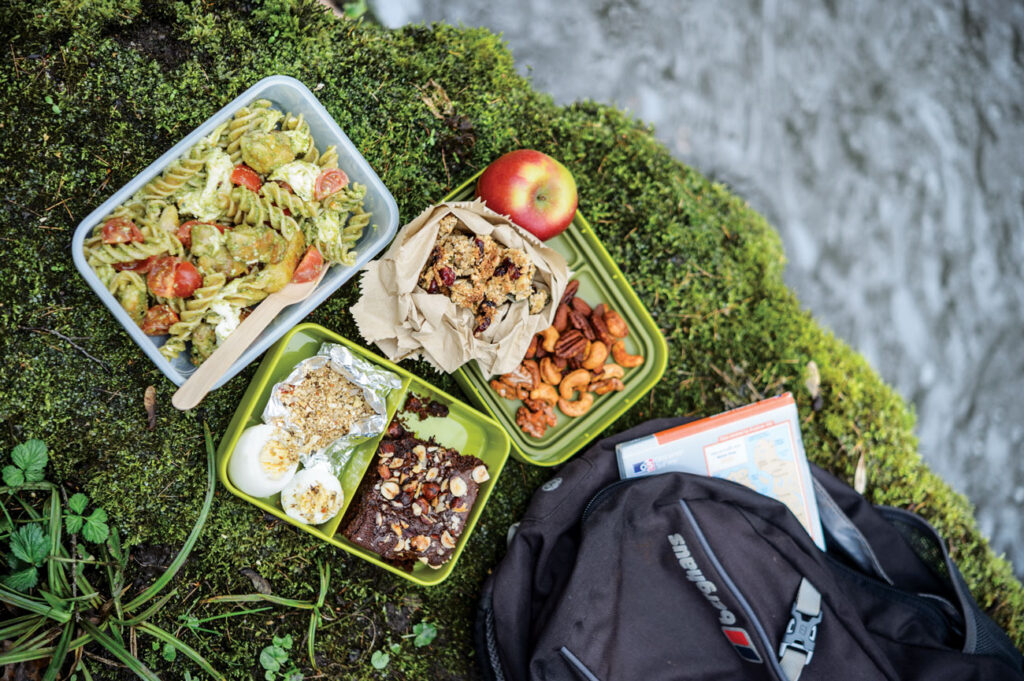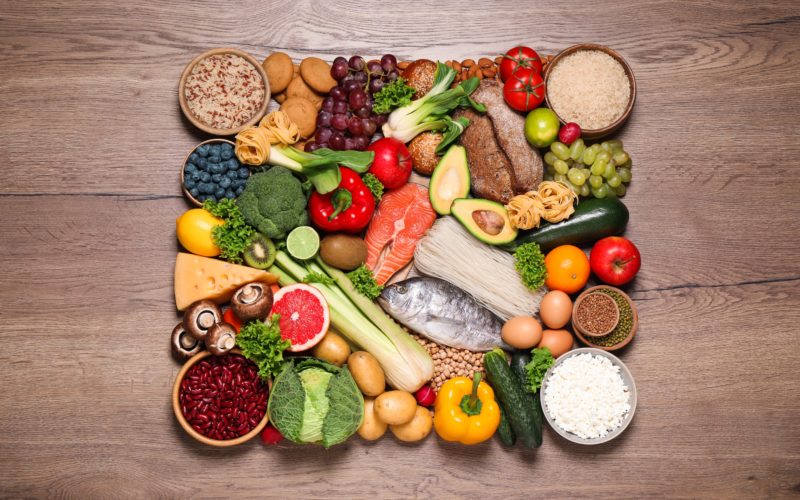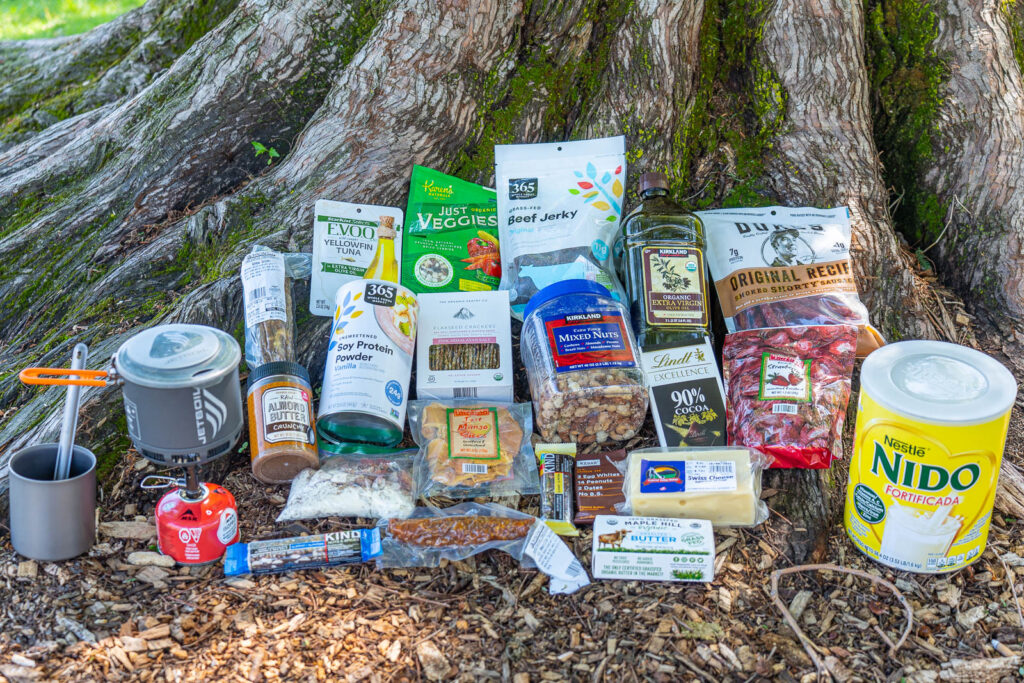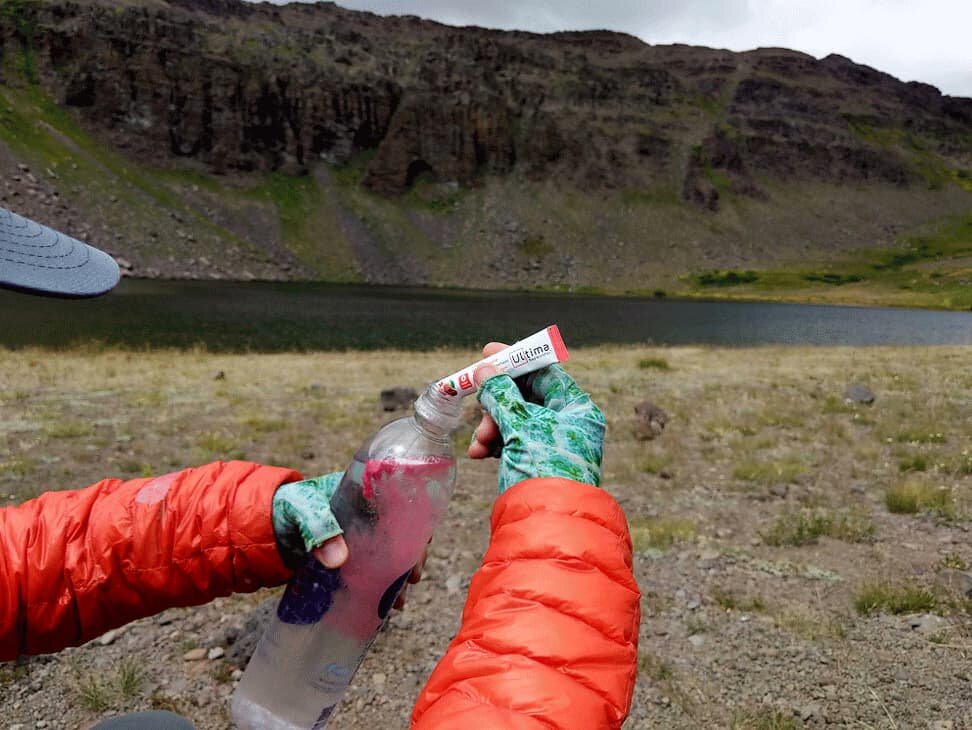
Hiking is an exciting outdoor activity that triggers you to connect with nature, challenge yourself physically, and explore breathtaking landscapes. Whether you’re a seasoned hiker or a beginner, proper nutrition is the one aspect you must consider before starting your journey. Choosing the right hiking foods can make all the difference as it provides you with the energy and sustenance you need on various levels of trails.
This comprehensive guide will explore the best hiking foods for different trails. We’ll also discuss the energy needs, macronutrient balance, and the guide to packing your hiking food. This guide will take you through the best food options for different trail levels, ensuring your hiking adventures are energizing and delicious.
Your Energy Needs on the Trail
Hiking is much more than a leisurely stroll in the park. It is a demanding physical activity that requires a lot of energy. You have to burn a lot of calories during your hike, and the number of calories burned can vary based on the following:
- Trail difficulty
- Your weight
- Backpack weight
A rule of thumb is that hikers usually burn about 200-300 calories per hour during their hike.
Macronutrient Balance
Your hiking diet should have a balance of carbohydrates, proteins, and fats to provide you with sustained energy. A macronutrient balance includes the following:


- Carbohydrates – These are your primary energy source. You may have whole grains, fruits, and energy bars to get carbs.
- Proteins – These are vital for muscle repair. You can opt for nuts, seeds, and jerky as protein sources.
- Fats – Fats are dense in energy and keep you full for longer. For fats, you may pack avocados, nuts, and dark chocolate in your bag.
Step-by-Step Guide To Packing Your Hiking Food
Following are the easy steps you can follow for the best hiking experience when it comes to your meals:
- Assess the Trail – In the first step, consider the length and difficulty of your hike. Find out whether your trail is easy, moderate, or tough.
- Calculate Energy Needs – Estimate how many calories you’ll need during your journey.
- Balance Your Macronutrients – According to your calculated energy needs, balance your macronutrients and aim for a mix of carbs, proteins, and fats.
- Pack Smartly – After balancing your macronutrients, choose the best possible options. Use lightweight, non-perishable foods for longer hikes.
- Stay Hydrated – Don’t forget to bring enough water and consider electrolyte supplements.
To calculate your energy needs while hiking, click here:
Hiking Food Basics
Before diving into specific foods for different hiking trails, let’s establish some basic principles for selecting the ideal foods for hiking. Regardless of the trail difficulty, the best hiking food should meet the following criteria:
- Nutrient Density – Choose nutrient-dense foods. It will help you make the most of each calorie consumed. These foods must provide essential vitamins, minerals, and nutrients your body needs for peak performance (proteins, carbohydrates, and fats).
- Caloric Content – As hiking burns a significant amount of calories, you’ll need foods with calorie-rich content. High amounts of calories keep your energy levels up. However, on more accessible trails, you may require fewer calories than more challenging trails.
- Ease of Preparation – Opt for foods that require minimal preparation and are easy to pack. Lightweight and compact options are a must because you’ll carry your food.
- Long Shelf Life – Hiking foods you’re carrying along with you should have a long shelf life. It will help to withstand the rigors of outdoor travel. Long shelf life ensures your food stays fresh throughout your hike.
- Hydration – While carrying your food along your trail, don’t forget your hydration. Alongside solid foods, bring water or a way to purify water from natural sources along your journey.
Remember these principles; let’s break down the best hiking foods based on your trail difficulty.
Best Hiking Foods For Different Trails
Based on the trail difficulty and your personal needs, the following are some of the best food options you can carry along with you:


Hiking Foods For Easy Trails
Easy hiking trails are usually shorter, flatter, and well-marked. These features make them suitable for beginners or those seeking a more relaxed outdoor experience. Here are some of the ideal hiking foods for easy trails:
Trail Mix – Trail mix must be a classic choice for travelers hiking on easier paths and looking to enjoy a stay there. It combines the energy of nuts and seeds with the sweetness of dried fruits. Trail mix is a convenient, calorie-dense snack, and requires no refrigeration.
Energy Bars – These energy bars are packed with nutrients and designed for on-the-go consumption. These bars are available in various flavors and provide a quick energy boost during the hiking.
Jerky – It is a protein-rich option that doesn’t spoil quickly. There are multiple options in jerky, including beef, turkey, or vegan jerky. It’s a savory snack that helps keep you fueled during trail hiking.


Peanut Butter Packets – Carrying peanut butter packets on your easier hiking trails is another option for you. These individual packets of peanut butter are compact and provide a good source of proteins and healthy fats.
Fresh Fruits – Fresh fruits, including apples, oranges, and bananas, are durable fruits that can withstand a day on the trail. They provide hydration and essential vitamins.
Crackers or Rice Cakes – Crackers or rice cakes are more satisfying and filling snacks if you want something healthy and delicious together. You can pair them with cheese or peanut butter as well.
Cheese Sticks – Cheese sticks can be a great addition to your hiking menu. These sticks are portable and packed with proteins.
For easy hiking trails, convenience is the key. Try to pack lightweight, non-perishable items. These will keep your energy levels up and stable without much fuss.
Best Hiking Foods For Moderate Trails
Moderate hiking trails offer more challenges than the easier, flatter trails of the previous trails. These trails have varying terrain and longer distances. For intermediate hiking trails, choosing foods that provide you with sustained energy and quick recovery is essential Here, are some of the best options:
Dehydrated Meals – These are lightweight, freeze-dried meals in various flavors. They provide a hot, satisfying meal option on the trails. To make these dehydrated meals edible, you have to add hot water.
Nut Butter Squeeze Packs – These are high sources of healthy fats and proteins. Available in almond or cashew butter squeeze packs, these are easy to consume and can also be paired with crackers or fruits.
Instant Oatmeal – It is a warm and filling breakfast option during hiking moderate trails. Instant oatmeal can be customized with nuts, dried fruits, or a drizzle of honey.
Hard-Boiled Eggs – Pre-peeled hard-boiled eggs can be a protein-packed snack in your hiking menu. These do not require refrigeration for a day hike.
Tortillas – Tortillas are a versatile and durable snacking option while hiking a moderate journey. These are filled with various ingredients like cheese, beans, and avocados. Tortillas are considered one of the best options during your trail.
Dark Chocolate – Dark chocolate provides a sweet treat and a quick energy boost to your journey. It is a natural source of caffeine that can help you stay active and alert during the hike.
Electrolyte Tablets – You can add electrolytes with dissolvable tablets into your water bottle. These electrolyte tablets can keep you hydrated and replenished.


Moderate hiking trails demand a balance of carbohydrates, proteins, and healthy fats. This balance helps keep your stamina up during the hike. During these tracks, dehydrated meals are particularly valuable for refueling.
Hiking Food for Tough Trails
These include more challenging and strenuous trails. When tackling these trails, your body requires the most substantial substance. It helps to conquer steep ascents, high altitudes, and long distances. Here are some of the powerhouse foods you can carry while hiking on tough trails:
Hydrated Backpacking Meals – These meals are specially designed for multi-day hikes. These meals help provide you with various nutrients, including essential proteins and complex carbohydrates. Hydrated backpacking meals have a long shelf life, so you can carry them longer.
Nuts and Seeds – Almonds, cashews, chia seeds, and pumpkin seeds are among the popular seeds you can carry on tough trails. These nuts and seeds are calorie-dense and packed with healthy fats and proteins.
Dried Meats – Consider carrying dried meat if you’re on a multi-day journey. You may take dried salami and sausage for a protein-rich option. You can cook these meats whenever and wherever you need during a hike.
Instant Coffee or Tea Bags – A caffeine boost is always a game-changer during challenging hikes. Pack some instant coffee or a bag of your favorite tea with you.


Nutrient Powders – You can add high-quality nutrient powders to your water. It will give you an extra boost of vitamins and minerals.
Freeze-Dried Fruits and Vegetables – These freeze-dried fruits and vegetables provide essential vitamins and can be added to your meals for a nutritional punch.
Canned Foods – Canned foods are a good option for extended trips. The best canned food options include tuna, beans, and soup.
Energy Gels – These are convenient single-serving gels. They provide a quick energy jolt during strenuous portions of your hike.
Remember that hydration is crucial on tough trails. So, ensure you have enough water and a water purification system along your journey. Your goal must be to replenish the substantial calories burned while maintaining endurance and preventing fatigue.
Special Dietary Considerations
Hikers having special diet routines may have the following considerations:
Vegan and Vegetarian Hikers – Plant-based eaters may have issues while choosing from the above-mentioned options. They can focus on nut butter, legumes, and soy-based snacks for protein. Quinoa and buckwheat are excellent carb sources.
Gluten-Free Dietary Options –
For gluten-free dietary options, you may have granola bars, rice cakes, and fruits. Be sure to check labels for hidden gluten in processed foods.
Keto-Friendly Foods – Hikers opting for a keto-friendly diet may focus on nuts, seeds, and cheese for high-fat, low-carb dietary options.


For further information on hiking foods for different trails, you can check out reputable sources like REI’s Hiking and Camping Guide or Backpacker’s Hiking Nutrition Guide.
Final Thoughts
Selecting the best hiking foods for different trails offers a successful and enjoyable experience. By understanding the trail difficulty and your nutritional needs, you can pack the most appropriate food for easy, moderate, and tough trails. It will help keep you fueled and energized throughout the journey.
Always follow ‘Pack out what you pack in’ and ‘Leave no trace’ principles to preserve the beauty of the wilderness. With the right foods in your backpack, you’ll be well-prepared to tackle any hiking adventure that comes your way. So, gear up, choose the best hiking foods for your trail, and set up on your next outdoor adventure with confidence!
FAQs: The Best Hiking Foods For Different Trails
Q: I’m going on a short hike (under 3 hours). What kind of food should I pack?
A: For short hikes, focus on easily digestible carbs that will give you a quick energy boost. Fresh fruits like apples, bananas, or oranges are excellent choices. Granola bars, trail mix with dried fruits and nuts, energy chews, and nut butter with crackers are all great options to keep your energy levels up on shorter trails.
Q: What about moderate hikes lasting 3-6 hours?
A: For moderate hikes, you’ll want a mix of carbs, protein, and healthy fats to provide sustained energy throughout your adventure. Pack sandwiches made with whole-wheat bread and lean protein like chicken or turkey. Wraps, dried fruits, hard-boiled eggs, protein bars with whole grains, and cheese with whole-wheat crackers are all great options to keep you fueled for the trail.
Q: I’m planning a challenging hike over 6 hours. What foods should I bring?
A: Strenuous hikes require more calories to replenish energy stores. Prioritize high-calorie foods for these adventures. Energy gels or chews are great for quick bursts of energy during exertion. Pack trail mix with nuts and seeds, dried fruit and nut butter packets, or tuna or salmon pouches for protein. Consider cooked whole-wheat pasta with pesto for a filling and delicious option.
Q: What if I’m going backpacking for multiple days?
A: Backpacking trips require lightweight, high-calorie, and shelf-stable food options. Dehydrated meals (pre-packaged or homemade) are a great space-saving choice. Oatmeal packets, energy bars, trail mix, nut butters, and freeze-dried fruits are all excellent backpacker staples. Consider instant coffee or tea for a hot drink on the trail, and protein powder can be mixed with water for an extra protein boost.
Q: It’s going to be a hot day on the trail. What kind of food should I pack?
A: When hiking in hot weather, focus on hydrating foods and electrolytes to prevent dehydration. Watermelon, cucumber slices, and fruits with high water content like berries and oranges are perfect choices. Electrolyte tablets or drinks, sports chews, and trail mix with pretzels or popcorn will help you stay replenished on a hot hike.
Q: What about cold weather hikes? How should I adjust my food choices?
A: Cold weather hikes require high-calorie foods to generate heat. Pack dried fruits and nuts for a quick energy source. Granola bars with chocolate, jerky, instant oatmeal with added nuts and seeds, hot cocoa packets, and cheese with whole-wheat crackers will all help you stay warm and fueled on a cold day.
Q: I’m planning a hike at high altitude. What foods should I bring?
A: At high altitudes, choose easily digestible carbs that provide readily available energy. Candy like gummy bears or jelly beans, energy gels or chews, applesauce pouches, pretzels, and bagels with nut butter are all great options for high-altitude hikes.
Q: This is my first hike. What are some beginner-friendly food choices?
A: As a beginner, opt for familiar and easy-to-eat options to avoid any digestive discomfort on the trail. Pre-cut fruits and vegetables, granola bars, trail mix with dried fruits and chocolate chips, peanut butter and jelly sandwiches on whole-wheat bread, and cheese and crackers are all great choices for first-time hikers.
Q: I have dietary restrictions. Are there still good hiking food options for me?
A: Absolutely! There are plenty of delicious and nutritious options for all dietary needs.
- Vegetarians can enjoy cheese and veggie wraps, hummus and veggie sticks, or trail mix with dried fruits and seeds.
- Vegans can find energy bars and chews made with plant-based protein, nut butter packets with whole-wheat crackers, or fruit and nut trail mix.
- Hikers with gluten sensitivity can choose rice cakes with nut butter, trail mix with gluten-free grains and seeds, or pre-made gluten-free sandwiches or wraps.
Q: I have a nut allergy. What hiking snacks can I safely take?
A: If you have a nut allergy, be mindful of your food choices. Opt for trail mix with seeds and dried fruits, sunflower seed butter on crackers, or granola bars made with nut-free butters like sunflower seed butter.
Q: I’m allergic to dairy. Are there any good hiking food options for me?
A: For dairy allergies, choose soy cheese with crackers, fruit and nut trail mix, or pre-made sandwiches with vegan cheese or hummus.
Remember, these are just general recommendations. It’s always best to experiment and find what works best for you and your body. Here are some additional tips:
- Pack more food than you think you’ll need. It’s better to be safe than hungry on the trail.
- Don’t forget about portion sizes. Pre-portion snacks into individual bags or containers to avoid overeating.
- Bring a reusable water bottle and stay hydrated! Aim to drink plenty of water throughout your hike, even if you don’t feel thirsty.
- Consider your taste preferences. Choose foods you actually enjoy eating to avoid getting tired of your trail mix by the end of the hike.
- Think about packaging. Choose lightweight and compact packaging to save space in your backpack.
- Dispose of trash properly. Leave no trace and pack out all your garbage.
Happy hiking!

